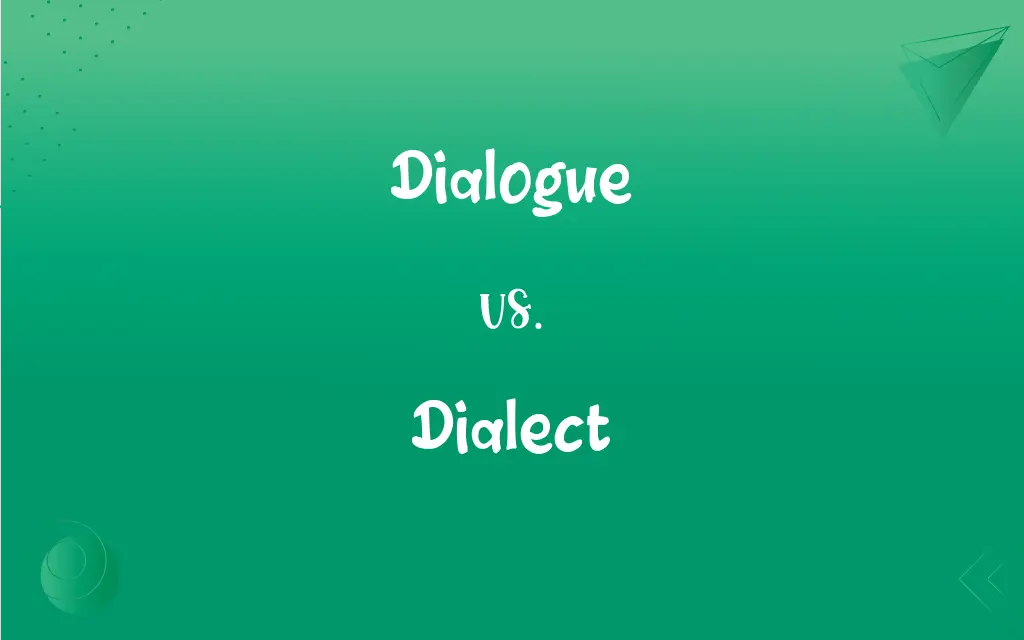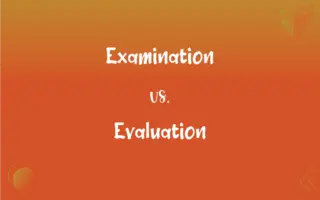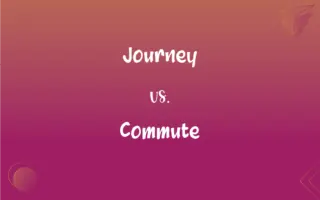Dialogue vs. Dialect: What's the Difference?
Edited by Aimie Carlson || By Janet White || Updated on September 27, 2023
"Dialogue" refers to a conversation between two or more people, while "Dialect" denotes a regional or social variety of a language.

Key Differences
"Dialogue" and "Dialect" are two words that may sound similar but have distinct meanings in the realm of language and communication. "Dialogue" chiefly pertains to the exchange of words between individuals. It's a conversational element that showcases the back-and-forth of communication. When we read novels, watch movies, or listen to radio plays, the verbal exchanges between characters are examples of dialogue. It plays a pivotal role in progressing narratives, revealing character insights, and establishing context.
On the other hand, "Dialect" is a term that represents a particular form or variant of a language. These variants are typically associated with specific regions or social groups. Every language can have multiple dialects, which might differ in terms of pronunciation, vocabulary, and sometimes even grammar. The beauty of dialects is that they can reflect the history, culture, and identity of their speakers. For example, English spoken in Texas might slightly differ from that spoken in New York due to dialectal variations.
While "Dialogue" represents interaction and communication between entities, "Dialect" epitomizes the richness and diversity of languages as they adapt and evolve in different settings. Both concepts are integral to understanding human communication, but they operate on different levels. A dialogue can occur in any language and any dialect, but the specific words used and their pronunciations might vary depending on the dialect of the speakers.
In summary, while both words play roles in the arena of language, "Dialogue" emphasizes the act of conversing, and "Dialect" underscores the variations within a language.
Comparison Chart
Basic Definition
A conversation between two or more people.
A regional or social variant of a language.
ADVERTISEMENT
Contextual Usage
Used in narratives to show character interaction.
Indicates the linguistic traits of a region or group.
Grammatical Role
Often a noun, indicating spoken exchanges.
Noun, depicting language varieties.
Examples
Found in books, movies, plays.
Different pronunciations, vocabularies across regions/groups.
Level of Language
Pertains to interaction within a language.
Reflects varieties and adaptations of a language.
Dialogue and Dialect Definitions
Dialogue
Written conversational exchange in a book or play.
The author's use of dialogue was both witty and engaging.
ADVERTISEMENT
Dialect
A variant of a language with unique pronunciation and vocabulary.
The British and American dialects of English differ in many ways.
Dialogue
A discussion with the aim to resolve a conflict.
The two nations entered into a dialogue for peace.
Dialect
The language habits of a particular community.
The immigrant community retained their unique dialect.
Dialogue
The lines spoken by characters in a film or play.
The movie had a memorable dialogue that became famous.
Dialect
A regional variation of a language.
The southern dialect has a distinct charm.
Dialogue
An exchange of ideas or opinions.
The dialogue at the conference sparked new innovations.
Dialect
A linguistic pattern tied to culture or geography.
The coastal dialects often have words related to the sea.
Dialogue
A conversation between two or more people.
Dialect
A regional or social variety of a language distinguished by pronunciation, grammar, or vocabulary, especially a variety of speech differing from the standard literary language or speech pattern of the culture in which it exists
Cockney is a dialect of English.
Dialogue
A discussion of positions or beliefs, especially between groups to resolve a disagreement.
Dialect
A variety of language that with other varieties constitutes a single language of which no single variety is standard
The dialects of Ancient Greek.
Dialogue
Conversation between characters in a drama or narrative.
Dialect
The language peculiar to the members of a group, especially in an occupation; jargon
The dialect of science.
Dialogue
The lines or passages in a script that are intended to be spoken.
Dialect
The manner or style of expressing oneself in language or the arts.
Dialogue
A literary work written in the form of a conversation
The dialogues of Plato.
Dialect
A language considered as part of a larger family of languages or a linguistic branch. Not in scientific use
Spanish and French are Romance dialects.
Dialogue
(Music) A composition or passage for two or more parts, suggestive of conversational interplay.
Dialect
A lect (often a regional or minority language) as part of a group or family of languages, especially if they are viewed as a single language, or if contrasted with a standardized idiom that is considered the 'true' form of the language (for example, Cantonese as contrasted with Mandarin Chinese or Bavarian as contrasted with Standard German).
Dialogue
To express as or in a dialogue
Dialogued parts of the story.
Dialect
A variety of a language that is characteristic of a particular area, community, or social group, differing from other varieties of the same language in relatively minor ways as regards grammar, phonology, and lexicon.
Dialogue
To engage in a dialogue.
Dialect
(pejorative) Language that is perceived as substandard or wrong.
Dialogue
A conversation or other form of discourse between two or more individuals.
Bill and Melinda maintained a dialogue via email over the course of their long-distance relationship.
Start up a dialogue
Dialect
A language existing only in an oral or non-standardized form, especially a language spoken in a developing country or an isolated region.
Dialogue
(authorship) In a dramatic or literary presentation, the verbal parts of the script or text; the verbalizations of the actors or characters.
The movie had great special effects, but the dialogue was lackluster.
Dialect
A variant of a non-standardized programming language.
Home computers in the 1980s had many incompatible dialects of BASIC.
Dialogue
(philosophy) A literary form, where the presentation resembles a conversation.
A literary historian, she specialized in the dialogues of ancient Greek philosophers.
Dialect
(ornithology) A variant form of the vocalizations of a bird species restricted to a certain area or population.
Dialogue
(computing) A dialogue box.
Once the My Computer dialogue opens, select Local Disk (C:), then right click and scroll down.
Dialect
Means or mode of expressing thoughts; language; tongue; form of speech.
This book is writ in such a dialectAs may the minds of listless men affect.Bunyan.The universal dialect of the world.
Dialogue
To discuss or negotiate so that all parties can reach an understanding.
Pearson wanted to dialogue with his overseas counterparts about the new reporting requirements.
Dialect
The form of speech of a limited region or people, as distinguished from ether forms nearly related to it; a variety or subdivision of a language; speech characterized by local peculiarities or specific circumstances; as, the Ionic and Attic were dialects of Greece; the Yorkshire dialect; the dialect of the learned.
In the midst of this Babel of dialects there suddenly appeared a standard English language.
[Charles V.] could address his subjects from every quarter in their native dialect.
Dialogue
(transitive) To put into dialogue form.
Dialect
The usage or vocabulary that is characteristic of a specific group of people;
The immigrants spoke an odd dialect of English
He has a strong German accent
Dialogue
(obsolete) To take part in a dialogue; to dialogize.
Dialect
A form of speech related to a specific group.
The miners had a dialect full of specialized terms.
Dialogue
A conversation between two or more persons; particularly, a formal conservation in theatrical performances or in scholastic exercises.
Dialogue
A written composition in which two or more persons are represented as conversing or reasoning on some topic; as, the Dialogues of Plato.
Dialogue
To take part in a dialogue; to dialogize.
Dialogue
To express as in dialogue.
And dialogued for him what he would say.
Dialogue
A conversation between two persons
Dialogue
The lines spoken by characters in drama or fiction
Dialogue
A literary composition in the form of a conversation between two people;
He has read Plato's Dialogues in the original Greek
Dialogue
A discussion intended to produce an agreement;
The buyout negotiation lasted several days
They disagreed but kept an open dialogue
Talks between Israelis and Palestinians
Dialogue
A conversation between two or more individuals.
The dialogue between the protagonists was enlightening.
FAQs
Can one language have multiple "Dialects"?
Yes, many languages have several dialects based on region or culture.
Can "Dialogue" exist in written form?
Yes, dialogue can be written, as seen in books and scripts.
Can "Dialogue" happen between more than two people?
Absolutely, dialogue can involve multiple participants.
Can a "Dialect" change over time?
Yes, dialects can evolve based on cultural, societal, and geographical changes.
Does "Dialogue" always have to be verbal?
No, it can be any form of interactive communication, including written or signed.
Is "Dialogue" always spoken?
Mostly, but it can also be written or even signed in sign languages.
Is "Dialogue" crucial in storytelling?
Yes, it's essential for character development, plot advancement, and context.
Is a "Dialect" considered a separate language?
Not typically. Dialects are variants of a primary language, though they can be distinct.
Why do "Dialects" form?
They arise due to regional, social, or cultural influences on language.
Is "Dialect" just about pronunciation?
No, it can also involve variations in vocabulary, grammar, and usage.
Can "Dialects" be mutually unintelligible?
Sometimes, especially if the dialects have evolved significantly apart.
Are "Dialects" static or dynamic?
Dialects are dynamic and can change over time.
Can a single character's speech be called "Dialogue"?
Typically, dialogue involves exchange; a single character's speech is often a monologue.
Can "Dialogue" exist in non-fiction?
Yes, real-life conversations in non-fiction works are dialogues.
How do "Dialogue" and "Dialect" relate?
Dialogue is the act of conversing, which can be done in any dialect of a language.
About Author
Written by
Janet WhiteJanet White has been an esteemed writer and blogger for Difference Wiki. Holding a Master's degree in Science and Medical Journalism from the prestigious Boston University, she has consistently demonstrated her expertise and passion for her field. When she's not immersed in her work, Janet relishes her time exercising, delving into a good book, and cherishing moments with friends and family.
Edited by
Aimie CarlsonAimie Carlson, holding a master's degree in English literature, is a fervent English language enthusiast. She lends her writing talents to Difference Wiki, a prominent website that specializes in comparisons, offering readers insightful analyses that both captivate and inform.































































